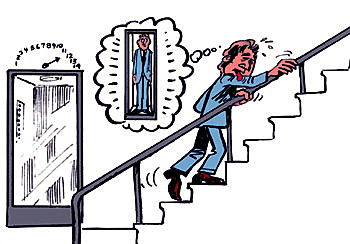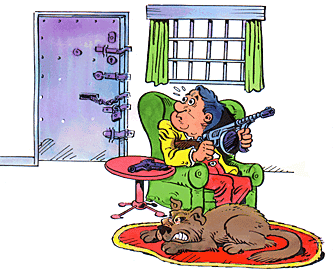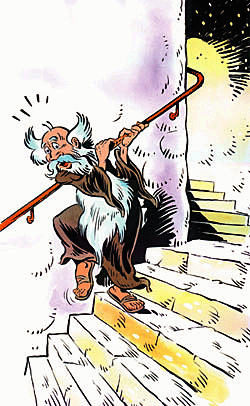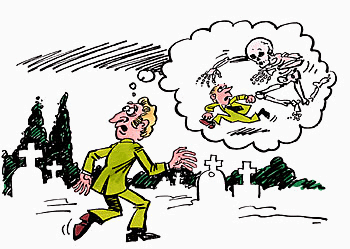claustrophobic
(s) (noun), claustrophobics
(pl)
An individual who reacts with severe panic and suffocation when he or she feels hemmed in, or is being trapped and can't get out: There are some
claustrophobics who have strong anxieties about being in elevators even for a short time.
As a result of being closed in or cornered to any degree, claustrophobics may have severe panics and physiological symptoms including increased pulse and heart beats.
There are some claustrophobics who feel that they are choking and who have shortness of breath as if something were crushing their chests.

cleistophobia, cleithrophobia
(s) (nouns); cleistophobias, cleithrophobias
(pl)
An intensive fear of being in closed places or of being locked in some small space: There are people who are afflicted with cleistophobia and cannot tolerate being in a car, in a train, in a street car, or in a room in which they cannot open a window or the door.
cleithrophobia, cleisiophobia, clithrophobia
(s) (noun); cleithrophobias, cleisiophobias, clithrophobias
(pl)
A morbid fear of being enclosed or of closed areas, such as a form of claustrophobia: The psychiatrist has several patients who are suffering from clithrophobia because they are frightened of being locked in a room.
cleptophobia, kleptophobia
(s) (noun) (no plural)
1. An extreme horror of being robbed: Mr. and Mrs. Jones had many locks and bolts on their front door and all the windows locked because they both suffered from cleptophobia and were terribly frightened that thieves would enter their home.
2. In psychiatry, the fear of actively stealing and becoming a kleptomaniac: Greg was in therapy because of his kleptophobia, his morbid dread of becoming like his former friend who was quite involved with shoplifting on a regular basis!
cleptophobic, kleptophobic,
(adjective); more cleptophobic, more kleptophobic; most cleptophobic, most kleptophobic
Descriptive of the dread of thieves or of having something stolen: Susan became
kleptophobic after she had been robbed while out shopping.

In many cities around the world, crime is so rampant that many people are justly harpaxophobic or kleptophobic; that is, excessively fearful that their homes will be invaded by thieves. As a result, extreme precautions may be taken to keep unwelcome intruders from invading their homes.
climacophobia
(s) (noun), climacophobias
(pl)
An excessive fear of stairs, of falling down or climbing stairs, being hurt in a fall, or having anxiety about loftiness or high points: Those who suffer from
climacophobia regarding heights emphasize that their visual space is important and they will not be able to go down a flight of steps if they can see an open stairwell, and they are even terrified of looking through a long window which stretches from the floor to the ceiling, but not if the window's bottom is at or above the waist level.
A person affected by climacophobia may also be afflicted with other related phobias, such as bicycles, skiing, certain amusement rides, tall buildings, and bridges.

clinophobia
(s) (noun) (no plural)
An abnormal fear or strong dislike of going to bed or of beds in general: Those who have
clinophobia may have chronic insomnia, night terrors, sleepwalking experiences, or fear of bedwetting.
Some people who have clinophobia associate beds with the horror that they may fall asleep and never wake up again.
cnidophobia
(s) (noun), cnidophobias
(pl)
An excessive dread of being stung: Andrew refused to go on walks through forests, or even near one, because he had a fear of being bitten by insects or pricked by nettles or other plants, which his doctor diagnosed as a case of cnidophobia.
coimetrophobia, koimetrophobia
(s) (noun); coimetrophobias, koimetrophobias
(pl)
An excessive, or abnormal, fear of cemeteries: Those who are possessed with
coimetrophobia usually are also afraid of going to funerals, looking at tombstones or dead bodies, or just hearing about funerals.
Some people who have coimetrophobia will drive long distances out of their way to avoid going by such a place reserved for human and animal remains, or they will even walk on the other side of the street to avoid being close to one.

A man was so afraid of dying that he always stayed in his living room.
—Anonymous
He or she who pretends to look on death without fear, lies.
—Jean-Jacques Rousseau
coitophobia
(s) (noun), coitophobias
(pl)
1. An abnormal fear of having any sexual relationships: Grace had such bad luck with her romantic and intimate involvements with men that she decided to have them just as friends and not in love affairs. Her doctor described this condition as coitophobia.
2. Etymology: from coitophobia which is a hybrid word derived from the Latin coitus, which is the past participle of the verb coire, "to come together" + Greek phobos, "fear".
computerphobia
(s) (noun), computerphobias
(pl)
An intense dislike or exaggerated fear of computers or any association with them: Tom's grandmother, who was quite old and afflicted by
computerphobia, distrusted such data processors and always left the room when Tom was busy with his iPhone, iPad, or laptop.

A man has such a fear of computers that he imagines that a computer is trying to attack him.
computerphobic
(adjective), more computerphobic, most computerphobic
A reference to someone who is uncomfortable working with a computer: Paul has been a computerphobic person for some days as he strives to learn the technological knowledge which is necessary to get the results that he is striving to achieve.
contrectophobia
(s) (noun), contrectophobias
(pl)
1. A woman's fear of sexual abuse or of being touched or sexually fondled by someone: When Fern went to parties she had contrectophobia regarding men not behaving themselves when dancing with her.
2. Etymology: from Latin contrectare, "to handle" or "to take hold of".
coprastasophobia
(s) (noun) (no plural)
A fear of constipation: Some people who have coprastasophobia resort to taking laxatives regularly which can cause other physical problems.
counterphobia
(s) (noun), counterphobias
(pl)
A strong desire to find out what causes fears or anxieties instead of avoiding them: Dr. Smart pointed out to Jack that he was affected by counterphobia since he has decided to take up mountain climbing in an attempt to overcome his horror of heights.







